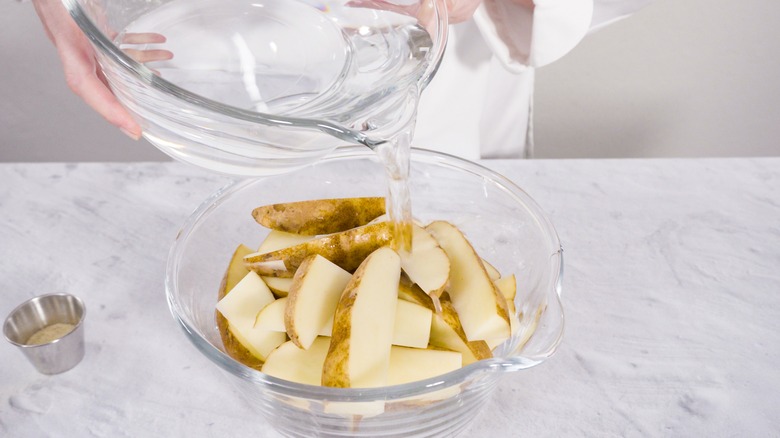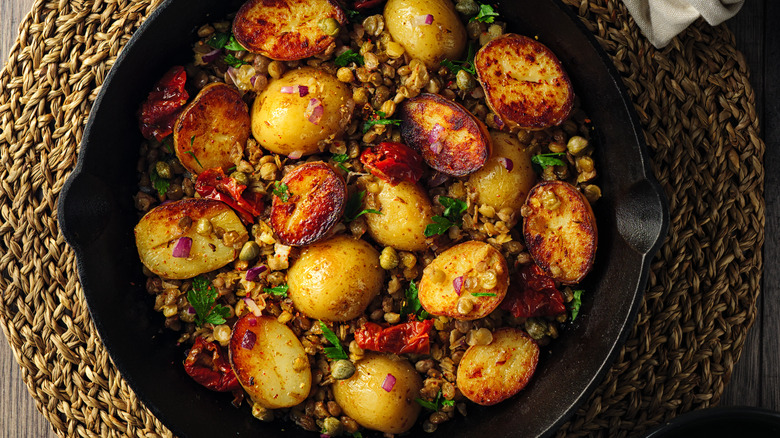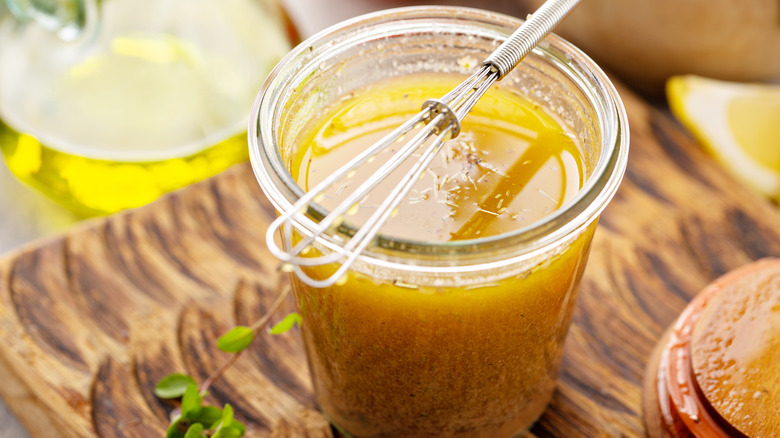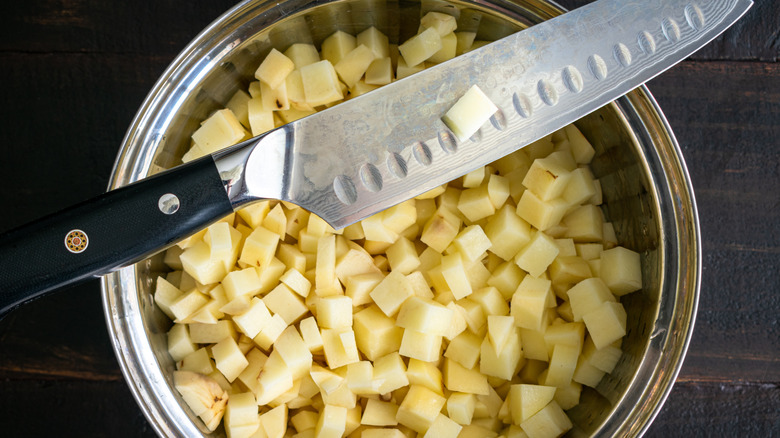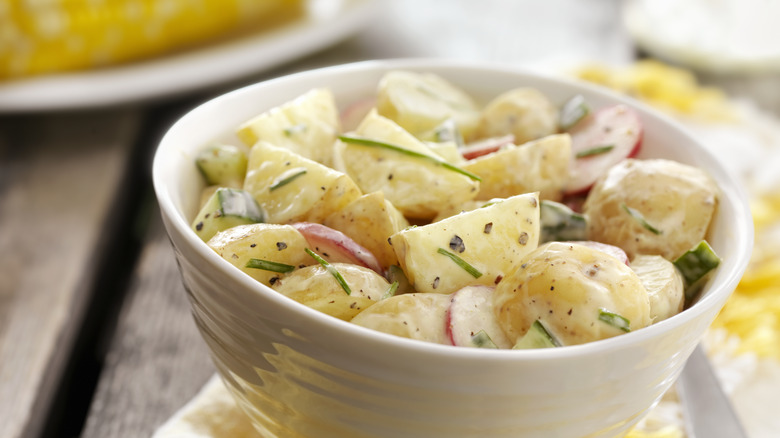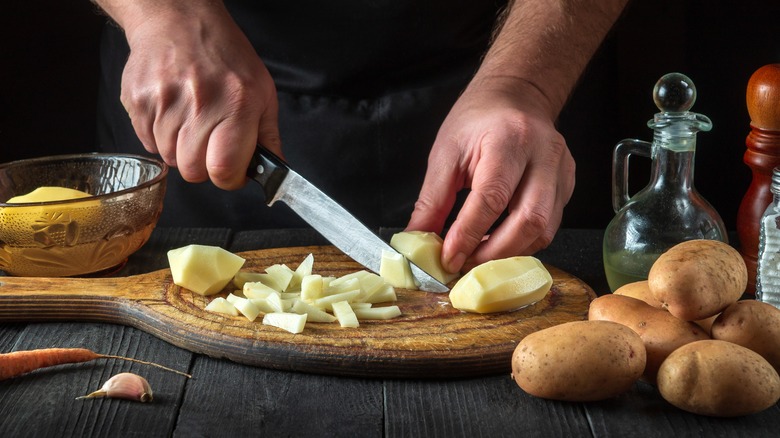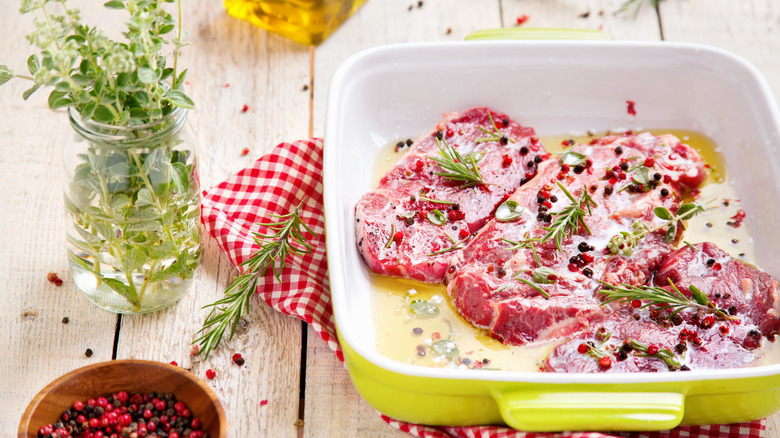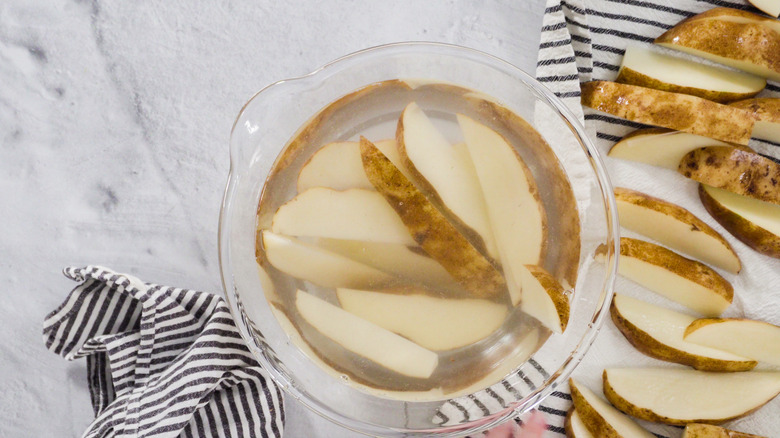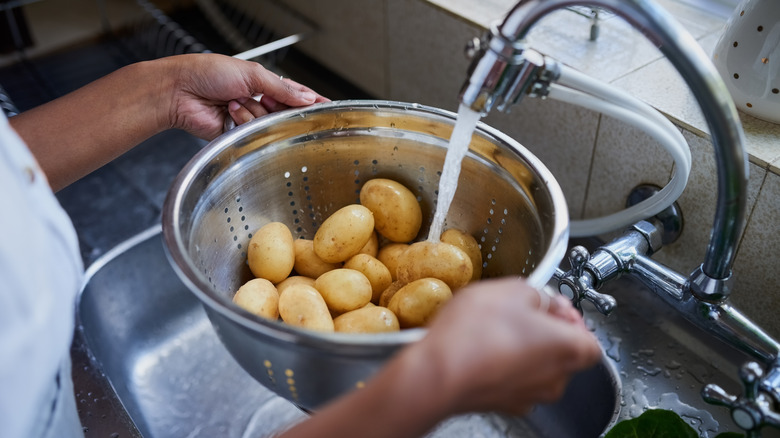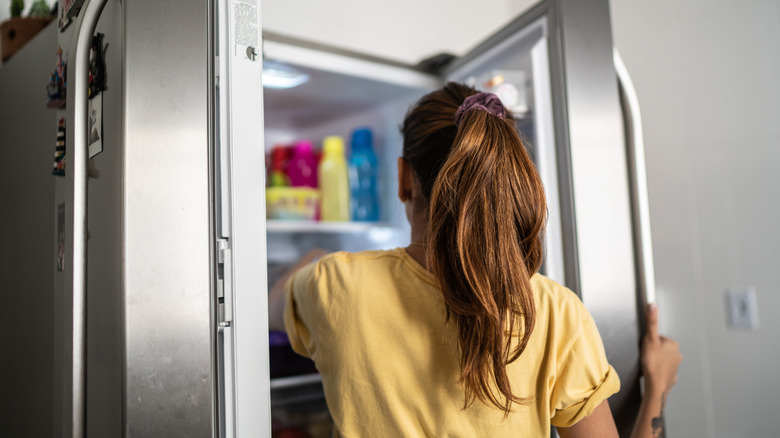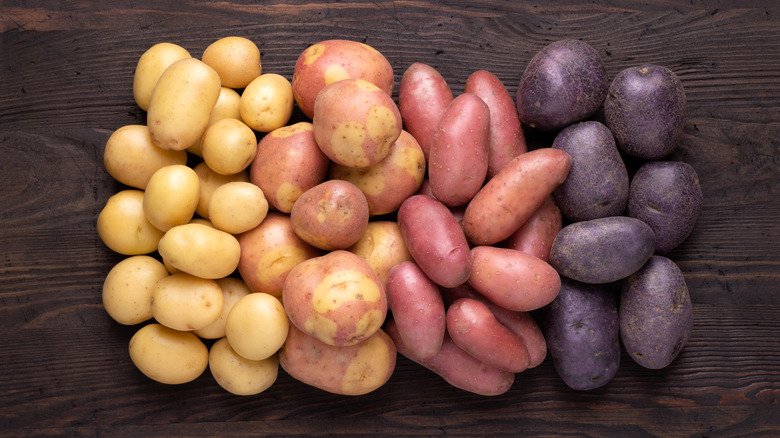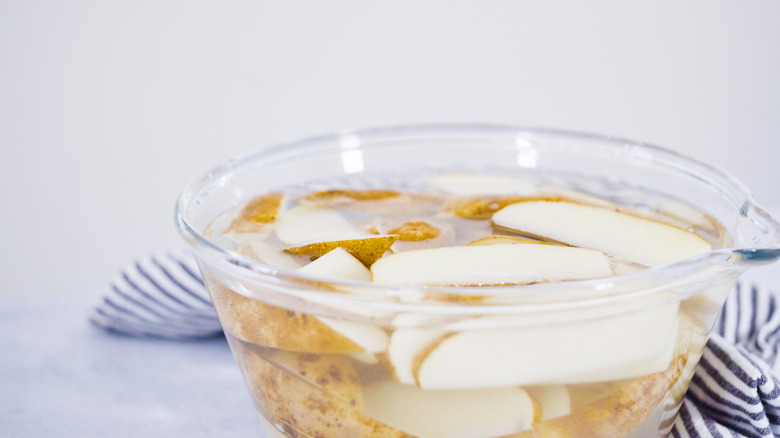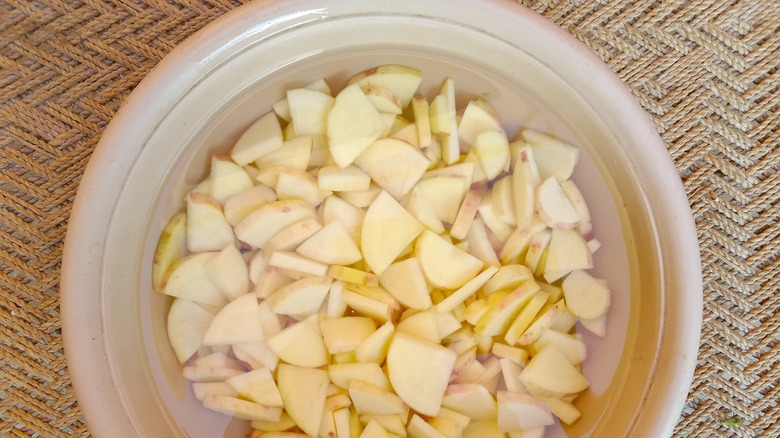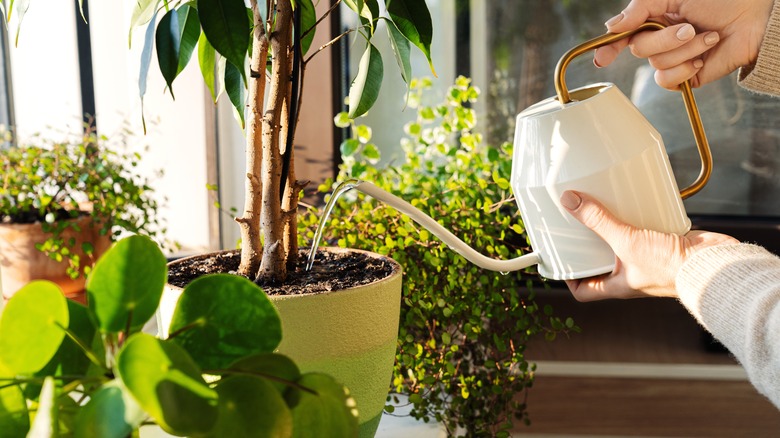All Your Questions About Soaking Potatoes, Answered
If you've ever worked in a restaurant or industrial kitchen, then you're well aware of the potato soaking process. For the rest of us who are seasoned or new-to-the-scene home cooks, this practice may have failed to cross our radar. But there are several reasons why professional chefs soak their potatoes in water, and sometimes soak them in marinades as well.
Because we tend not to do this with other produce, unless we're trying to give them a deep clean from pesticides, the purpose and process can be quite confusing. That's why we are prepared to answer all your questions about soaking potatoes, from all the whys, whats, and whens, all the way to the last flavorful detail.
The beautiful thing about potatoes, other than their pillowy, starchy texture and mild and universally loved flavor, is that they are incredibly versatile. You can fry, mash, scallop, whip, smash, bake, and boil them for a variety of crowd-pleasing outcomes. And to achieve that perfect flavor and texture, there are endless preparation hacks that most of us aren't even aware of. Soaking spuds in water and marinating potatoes are both a step toward gourmet tactics, so add these tips to your roster and be confused about soaking potatoes no more.
Does marinating potatoes make a difference?
The short answer is yes, marinating potatoes can make a huge difference when it comes to flavor. The long answer is that there are several ways to marinate potatoes, including the precook marinade and post-cook marinade. And when it comes to potatoes, we highly recommend loading up on herbs, spices, and sauces, as they are often quite mild in flavor.
While fresh potatoes, right out of the garden, tend to have a creamier texture and bolder flavor, most of the potatoes you find in the grocery store are quite mellow. Different varieties have different flavors, but all deserve to get dressed up, and marinating them is a great way to do that.
For a simple and quick potato marinade, simply use your favorite bottled marinade that you might use for other vegetables or proteins. Typically, an oil and acid-based marinade works well, but you can also use oil-based salad dressings like a vinaigrette. Feel free to take charge and make your own using oil, fresh herbs, citrus or vinegar, and spices. Simply soaking your potatoes in a tangy salt pickling vinegar brine before roasting or frying them can make quite a difference. Marinating your potatoes is the best way to infuse them with flavor, deep into their center, instead of just sprinkling a spice mix on top or dipping them into a sauce.
How long should I marinate potatoes?
When it comes to how long you should be marinating potatoes, there is some wiggle room. Like most marinades, the longer they sit, the more the potato will infuse with flavor. However, marinating for too long can cause bacteria buildup, and the finished product might not taste as fresh as it could.
If you're marinating your raw potatoes before cooking them, consider soaking them overnight. Potatoes are a rather starchy and tough vegetable, so it takes longer for the flavors to penetrate the flesh than it would, for instance, for tomatoes or eggplant. Be sure to slice or dice your potatoes before marinating them to help the infusion process along. However, if you have just half an hour, that can make quite a difference and is certainly better than nothing.
If you're marinating cooked potatoes in a sauce or dressing, for potato salad for instance, it's best to let it sit for at least 20 minutes before serving. However, have you ever noticed that foods like potato salad and coleslaw tend to taste better as leftovers? That's because it's had a chance to marinate for longer, so if you have the time to make your potato salad beforehand and let it sit overnight in a sealed container in the refrigerator, then consider doing so.
What should I marinate my potatoes in?
Simply grab your favorite salad dressing or marinade, or make your own from scratch. We recommend a strong marinade loaded with acids, herbs, and spices like the one used for Greek lemon potatoes. This particular recipe uses ingredients like olive oil, lemon juice, oregano, salt, and chicken broth. The fat of the olive oil is balanced by the acidity of the lemon, and the oregano adds an infusion of flavor. If you're making your own version from scratch, consider using olive oil and vinegar or citrus as a base, and then adding in your favorite fresh or dried herbs and spices from there.
We highly recommend using additional condiments like tamari, Worcestershire sauce, and Dijon mustard in your homemade marinades for an extra salty pop of flavor. Whole-grain mustard can give your roasted potatoes a nice texture and aesthetic appeal as well. When in doubt, use a simple vinaigrette formula to create a balanced marinade for your potatoes. And don't worry about overpowering the little spuds. Potatoes hold flavor nicely and are typically used in recipes for texture more so than for flavor.
Can I marinate raw potatoes?
If you'd like to infuse your potatoes with flavor before roasting them, then consider marinating them raw, before the cooking process begins. You'll want to be sure to use an oil-based marinade so that when the potatoes come in contact with heat, they are likely to crisp up nicely. The oil will additionally seal out oxygen to prevent oxidation and keep your spuds from browning, which a little bit of acid can help with as well.
It takes longer for raw potatoes to absorb flavor and sauce than cooked potatoes because they have not yet been broken down by the heating process. However, marinating raw potatoes still makes quite a large difference.
Try soaking your raw potatoes in marinade beforehand when making these roasted lemon potatoes, or simply before any baked, roasted, or grilled form. If you plan on deep frying or pan frying your potatoes, the marinade may not be as effective, as it could burn or disperse in the frying oil, but it can still make a subtle difference. Even if you marinate your potatoes raw, you can still season them after they are cooked with coordinating flavors and spices.
Can I marinate cooked potatoes?
Ever heard of potato salad? Marinating cooked potatoes can be easier than trying to infuse them with flavor raw because they are more likely to absorb the sauces. Marinate boiled and sliced potatoes for a delicious potato salad, like a French potato salad or a classic creamy dill potato salad recipe.
These little boiled potatoes become sponges for flavor, absorbing and holding onto any juicy sauces you allow them to soak in. It's best to cut them either before or after boiling because the skin will repel the marinade more than the exposed flesh. Let them sit for a minimum of half an hour, or up to a full overnight if you have the time. You can either mix them with just enough sauce to coat them, or soak them and strain them before serving. Both hot or cold potatoes can be soaked, but either way, if they are going to marinate for an extended period of time then it's best to let them do so in the refrigerator. This will help to prevent the growth of bacteria and help keep them fresh.
Will olive oil keep potatoes from turning brown?
When raw potatoes are cut and exposed to oxygen, they begin to turn brown. This process is called oxidation and can turn potatoes into an unpleasant color. If you're noticing your cut potatoes turn brown, red, or even black, then they have been exposed to oxygen for too long. This isn't harmful unless they've sat out, unrefrigerated, long enough to grow bacteria. In general, people prefer their potatoes to look fresh and un-rotten, so dunking them in a marinade or even a bucket of water can help prevent this.
Olive oil will create a coating over the exposed potato which does slow the oxidation process. However, the acidity from your marinade might be doing even more good. That lemon juice or vinegar that gives your marinade that extra punch of tangy flavor can stop your potatoes from browning. Think about it — you squirt lemon juice on sliced apples to keep them from browning, and this is a similar concept.
Be sure your raw potatoes are thoroughly coated in your marinade to prevent any oxidation and browning.
Can I marinate potatoes with raw meat?
When it comes to cooking with raw meat, it's good to be well-informed about how to safely handle it. Per the Centers for Disease Control, raw meat can cause food poisoning from bacteria such as salmonella, E. coli, and yersinia. However, after it's been heated to the proper temperature, that bacteria dies. Depending on the type of meat you are working with, it will have a different recommended minimum internal temperature. So if you plan to marinate your potatoes with raw meat, then it's important to test your potatoes to make sure that they are reaching that internal temperature as well.
Marinating your potatoes along with herbs, spices, and meat is a great way to infuse them with flavor. In fact, a great way to upgrade your roasted potatoes is with beef drippings, because the fat from the beef or other meat creates an oily and fatty coating that helps the potatoes to crisp up once cooked.
Be sure that you're only marinating raw potatoes with raw meat, so that they can reach a safe temperature together, rather than using a marinade that's had raw meat in it to dress precooked potatoes. If you can achieve this safely, the results can be quite delicious.
What are the benefits of soaking potatoes in water?
As previously stated, chefs and production kitchens often soak potatoes in water before cooking them. There are plenty of reasons for doing so. The first is that if the potatoes are prepped beforehand, which they often are in a commercial kitchen, submerging the potatoes in water prevents oxidation, so the potatoes remain white instead of turning brown. This, of course, is much more aesthetically pleasing once the potatoes are roasted.
In addition, this simple step will help potatoes cook more evenly. This is because soaking potatoes removes excess starch, which can build up and create a gummy and uneven texture. You can achieve the best results if you soak your potatoes, strain them, and then soak them again in fresh water. The starch will leach into the water, so if you replace it with pure water, you're likely to pull even more starch from them.
Keep in mind that you'll still need to be conscious of the temperature you roast your potatoes and how evenly you space them if you're trying to obtain the crispiest, most evenly cooked potatoes.
How do I prep potatoes for soaking?
Start by cleaning your potatoes. Potatoes are root vegetables, so it's likely that even if you purchase them from a grocery store where they have been prewashed that they may still have a little dirt stuck in their nooks and crannies. Use a vegetable scrub brush and fresh running water to clean your spuds. If you don't have a dedicated scrub brush, there are still ways you can clean your potatoes. Use a paper towel or clean, reusable cloth and work the potatoes under cold running water until they are squeaky clean.
Next, it's essential that you at least cut, if not cut and peel the potatoes before they are submerged in water. Otherwise, the starchy inside will not be exposed to the water, as the skin will create a barrier. Follow a few tips to make cutting potatoes easier, like cutting them with a freshly sharpened knife or at an angle. Then, when you're ready, dunk them in a vat of cold water. Be sure each piece is fully submerged. Then seal the top of your container and let the water work its magic.
Should you refrigerate soaking potatoes?
Once you have your cleaned and cut potatoes soaking happily in a sealed bin of cold water, what next? Well, you'll want to be sure that those potatoes remain cold. Room-temperature cut potatoes, like any meat or cut fruit or vegetable, will begin to rot and grow bacteria. Even if the water prevents oxidation, you still don't want any unnecessary bacteria developing from your countertop soaking process. The easiest way to avoid this is by storing your soaking potatoes in a container in the refrigerator.
However, if you don't have the refrigerator space, limit your countertop soaking to one to two hours. It can last up to four, by why risk it? You can also add ice to your water to keep the potatoes cold, or food-grade ice sticks. Just be sure anything that goes into your soaking container has been cleaned and is bacteria-free.
Once you've strained the potatoes, use them as soon as you can to prevent oxidation from catching back up with you.
What kinds of potatoes should be soaked before cooking?
There are plenty of varieties of potatoes out there, and we are so glad there are. From Yukon golds to Japanese sweet potatoes, it seems like the options are endless. Although we typically stick to yellow, red-skinned, russet, and sweet potatoes, you may notice that the potato section in your grocery store goes on and on, and that's just the tip of the iceberg. Luckily, you can use similar soaking methods for almost all of them.
If the goal is to remove starch from potatoes, then any potato can and should be soaked. This means that even sweet potatoes can be soaked to remove starch. However, when it comes to using soaking as a means to prevent oxidation, it's unnecessary to soak sweet potatoes. Sweet potatoes can be diced or peeled, and stored in the refrigerator for several days without changing color. White and yellow potatoes, on the other hand, will oxidize much easier. Therefore, If the center is light-colored, go ahead and soak them.
How long should I soak potatoes?
The length of time you should soak potatoes directly relates to the goal you're trying to accomplish. If you're simply trying to remove starch from potatoes then you can soak them for a shorter period, and strain and refill the water several times throughout the process to speed things along. Soak your potatoes for a minimum of 30 minutes in cold water, and then get to cooking.
If you're trying to prep potatoes beforehand and soak them to prevent oxidation, then try to prep your potatoes no more than 24 hours in advance. However, if you need to extend this period for whatever reason, you can do so by ensuring that your potatoes are stored at a cold temperature and that you swap out the water at least once. In addition, you can add a little lemon juice or vinegar to help prevent oxidation and preserve the potatoes if you're going over that 24-hour period.
Does soaking a potato remove flavor?
Potatoes are rather mild in flavor to begin with, so it's no surprise that home cooks would be worried about mellowing them out even more. Keep in mind that potatoes are a vehicle for sauces and seasonings, especially white potatoes, and can't be expected to be your main source of flavor. Luckily, soaking potatoes removes starch, not flavor. And as we know from baking, potato starch is almost entirely flavorless. Even sweet potatoes won't be altered in flavor by the soaking process. Don't worry about your water soaking up all of your potatoey goodness, and instead, look at all the possibilities for infusing your potatoes with even more flavor.
When it comes to flavoring your soaking water, feel free to use any herbs, spices, or acids that you wish. Salt will draw out water from the spuds, so you might avoid it. Instead, choose flavor boosters like hot chilies, lemon slices, vinegar, or other condiments.
What can I do with the starchy water after soaking potatoes?
There are two kinds of people in the kitchen. Those who can't wait to toss their veggie scraps down the garbage disposal or into the compost (or even trash can), and those who save every last bit to repurpose and reuse it. Luckily, there are plenty of ways to use up your vegetable scraps, from creating a homemade broth to turning them into chips. Even potato water can be repurposed!
Save all of that starchy water from soaking potatoes and use it to water your garden or household plants. Potatoes are loaded with nutrients, so it would be a shame to see the water dumped down the drain. Be sure you're using just pure potato water, and that you have not added any flavorings or salts, as they may harm the plants in concentration. Alternatively, you can save your potato water as a soup base. The starch will help to thicken any soup or broth naturally.
